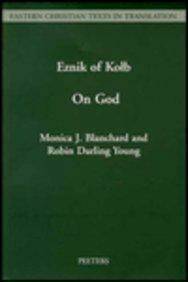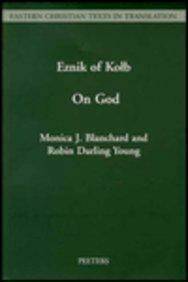
- Retrait gratuit dans votre magasin Club
- 7.000.000 titres dans notre catalogue
- Payer en toute sécurité
- Toujours un magasin près de chez vous
- Retrait gratuit dans votre magasin Club
- 7.000.000 titres dans notre catalogue
- Payer en toute sécurité
- Toujours un magasin près de chez vous
A Treatise on God Written in Armenian by Eznik of Kolb (Floruit C. 430-C. 450)
An English Translation, with Introduction and Notes
Mj Blanchard, Rd Young
29,75 €
+ 59 points
Description
The conversion of Armenia is traditionally dated to 314 when Gregory the Illuminator (c. 240-332) baptized King Trdat (298-330) and the royal family. Not until the fifth century did there develop both a Christian literature for Armenians in the Armenian languages, and the beginnings of a literary tradition in several genres which provided a coherent argument against the old religion of Zoroastrianism and made for the creation of Armenia as a Christian nation. Eznik of Kolb, later bishop of Bagrewand, studied in Edessa and in Constantinople among that first generation of Armenian Christians who made available in the newly established Armenian script translations of Greek and Syriac texts, including the Bible and other early Christian writings. Eznik composed a treatise of theology and apologetic in Armenian which has survived untitled in one manuscript. Modern editors and translators have titled this treatise On God or Against the Sects. Eznik addressed perceived threats to Christianity in Armenia from heretical and non-Christian movements, among them Valentinian Gnosticism and the schools of Greek philosophy, Marcionism, Manichaeism and Zoroastrian Zurvanism. Eznik's sources include the Bible; ancient Greek, non-Christian literature; earlier Greek patristic treatises and other works; Syriac patristic texts; and Iranian works either written or oral, concerning the Zurvanite form of Zoroastrianism and Armenian paganism. The central concern of the book is to contrast the monotheistic Christian God with the dualistic or polytheistic deities and religions of his opponents. Eznik's book is unusual in several aspects. It is the first apologetic treatise composed in Armenian, and it also provides a summary of early Christian doctrine as Eznik understood it. It contains unique information on the fifth-century teachings of Zurvanism and Marcionism. It attests to an Armenian theology conversant with both Syriac and Greek sources. It also opens a window into pre-Christian Armenian mythology and folklore. The English translation is based on the critical edition of Louis Maries and Charles Mercier.
Spécifications
Parties prenantes
- Auteur(s) :
- Editeur:
Contenu
- Nombre de pages :
- 222
- Langue:
- Anglais
- Collection :
Caractéristiques
- EAN:
- 9789042900134
- Date de parution :
- 01-01-98
- Format:
- Livre broché
- Format numérique:
- Trade paperback (VS)
- Dimensions :
- 164 mm x 240 mm
- Poids :
- 399 g







